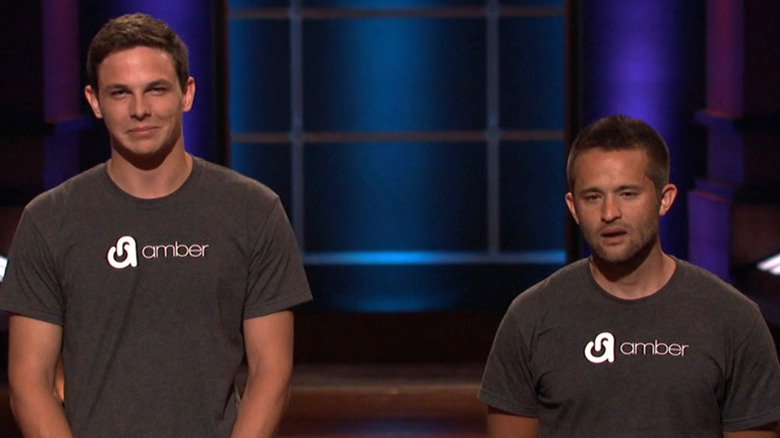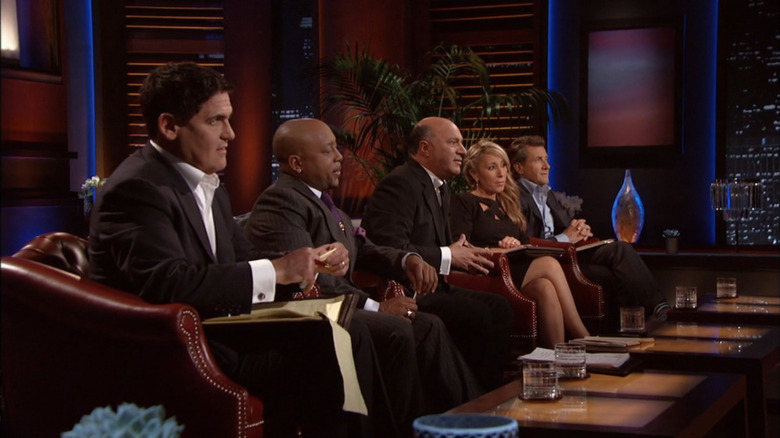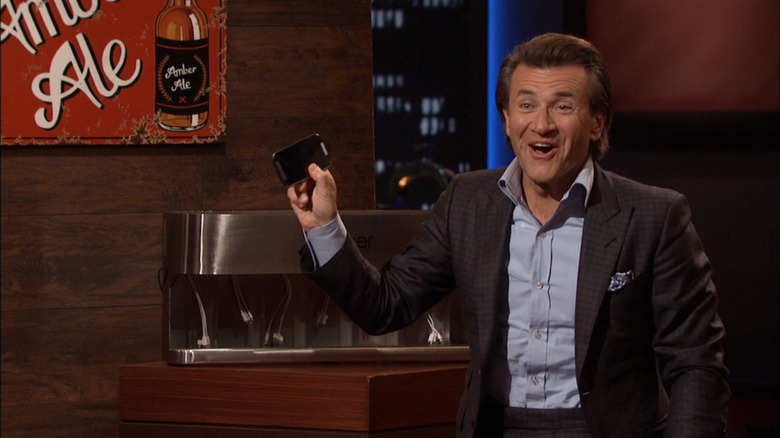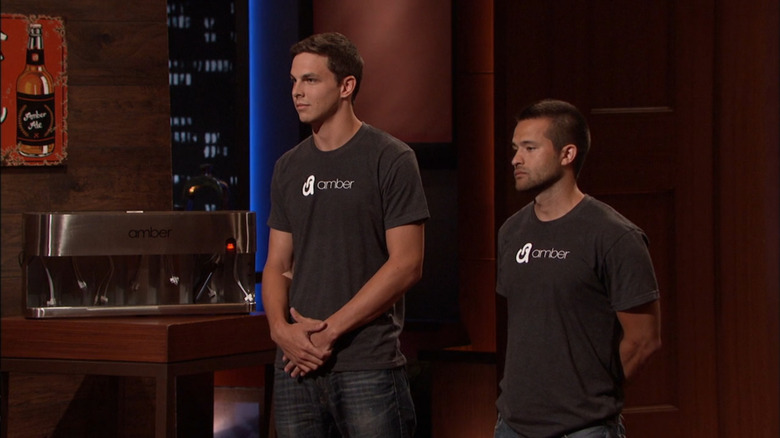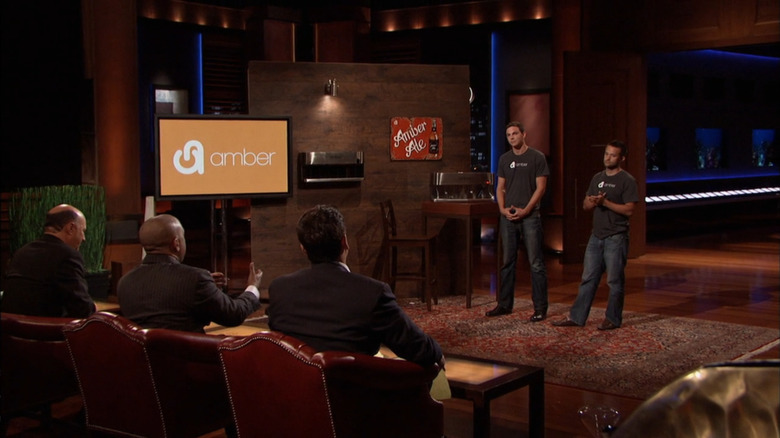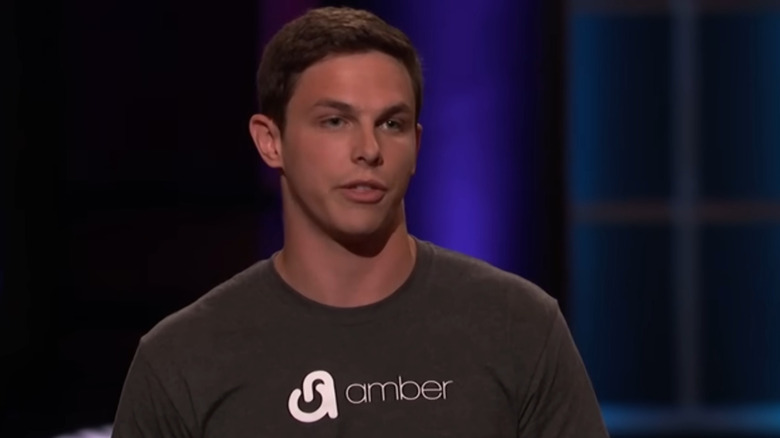Whatever Happened To Amber After Shark Tank?
We may receive a commission on purchases made from links.
For a show that's seen bizarre pitches ranging from fart-scented candles to technological ear implants, it may be surprising to learn that a relatively innocuous idea for a public charging station is often regarded as the worst "Shark Tank" pitch of all time.
Amber, a technology service designed to protect your phone while it charges in a public space, was first conceptualized by soon-to-be "Tank" contestant Bill Shuey while he was a political science student at James Madison University in 2013. After watching his phone slowly run out of juice at a local bar — and realizing his only options were to trust the bartender with his device or head home — he was inspired to invent something that could solve this problem for others in the future.
With an idea clearly in mind, he sought out a peer with the technological skills to bring it to life, eventually teaming up with industrial and product design major Kyle Byrd. Together, they began developing an Amber prototype while finishing their senior year at JMU, often using class time to make headway on the project. Their tireless work would ultimately lead to that inauspicious appearance on "Shark Tank" during Season 6. But does Amber really deserve its place among the worst "Shark Tank" pitches in history? Or is there more to this entrepreneurial story than meets the eye?
Amber was laughed out of the Shark Tank
Bill Shuey and Kyle Byrd appeared on Season 6, Episode 1, considered one of the best "Shark Tank" episodes thanks to the appearance of Bombas socks. Unfortunately, the Amber pitch didn't go quite as well. Shuey and Byrd were seeking $200,000 in exchange for 20% of Amber. The device — elegantly designed and slightly larger than a household toaster — could house up to seven phones, all protected behind individual plates of glass as they charged via protruding chords. To use Amber, patrons would simply register a thumbprint upon storing their phone. They wouldn't be charged for the service, while venue owners paid $150 a month (or a one-time payment of $2,000).
Unfortunately, when the entrepreneurs revealed they were currently "pre-revenue," the panel began to chuckle. Robert Herjavec began the feeding frenzy by pointing out how unreliable even the most expensive fingerprint scanners were, which Mark Cuban also pointed out as Byrd and Shuey explained their target customers would come from unsanitary venues such as bars or music festivals. Once it came out that the Amber device cost $1,000 to manufacture, the pitch devolved into an open-mic roast of the product.
Each Shark went out in turn, citing the product's lack of necessity, lamentable margins, and that competitors were already installing charging stations in public areas for free just for the advertising space. Though most tried to be gracious, Kevin O'Leary said with a smile, "I hate this so much, it's incredible." As Shuey and Byrd exited the Tank, the investors couldn't hold back their amusement. "I think that was the shortest pitch," smirked Lori Greiner, with O'Leary exclaiming in response, "It's the worst pitch!"
Amber's light flickered out
As the Sharks continued gleefully ribbing Amber with its co-founders out of the room, Kyle Byrd and Bill Shuey walked defeated to their post-"Shark Tank" interview. Though he acknowledged the Sharks' concerns about the device's cost and security, Shuey specifically seemed bitter about his experience. Standing next to a smiling Byrd, he said, "I mean, I would probably go rail [Robert] Herjavec in the teeth." When Byrd challenged with a light scoff, "Wow, that's rude," Shuey immediately turned to him and said, "Dude, [the interviewer] wanted me to be honest, I'm being honest." Byrd laughed the awkward interaction off, but it's hard to tell how serious Shuey actually was.
On their Instagram — which appears to have been started after the taping — Byrd and Shuey continued to post regular updates about the company, including partnerships with musician Drake and the Mandalay Bay Resort and Casino in Las Vegas. The hastily cobbled social media presence was likely meant to help the duo capitalize on the "Shark Tank" effect. However, the page went dark immediately after the episode aired, after about three months of activity. Its ominous final post showed Byrd sitting down to watch their "Shark Tank" pitch air for the world to see.
As for how quickly Amber dissolved afterward, we can only guess. No major outlets covered their appearance, and the website linked in their Instagram bio is dead as of writing. However, Amber's story is not quite over, as its "Shark Tank" legacy reveals the downside of appearing on the show.
Amber's Shark Tank legacy should be a cautionary tale
Amber has recently received more attention, thanks to the popular "Shark Tank" YouTube channels that upload individual pitches in digestible bites. Various official "Shark Tank" channels uploaded Amber's pitch in 2023, with titles begging the audience to question if what they're witnessing is the worst "Shark Tank" pitch ever seen. But Amber's "Shark Tank" journey is more complicated than the show has let on.
During their pitch, the Sharks continuously chastised Bill Shuey and Kyle Byrd for coming into the Tank with a product so early in development. It would eventually be revealed, however, that coming on the show was neither Shuey nor Byrd's idea — it was the show's. "Shark Tank" producers had found out about Amber (at the time merely a college side-project) through Shuey's portfolio and reached out directly to invite him to pitch. Shuey and Byrd — who had no knowledge of the show's existence or that they were reviewing the product — accepted the invitation while on spring break. They had to be ready to pitch by June of that same year.
Having their product torn to pieces in front of millions likely did more harm to Amber's credibility than any amount of free advertising could make up for. Though no one can claim to know if Amber would have been successful, it might not have crashed so tremendously if it hadn't been scrutinized publicly at such an early stage. Future "Shark Tank" hopefuls should take Amber's experience to heart, as it shows how damaging being on the show could be for the wrong product.
Where are Bill Shuey and Kyle Byrd now?
Since appearing on "Shark Tank," Bill Shuey appears to have retreated from the public eye as much as possible, with no online presence save for an empty Instagram account. It seems as though he has yet to try his hand again at entrepreneurship or inventing, and has instead found steady employment working in the sales department of a family-owned home improvement company.
Kyle Byrd has had a litany of career transitions since "Shark Tank." The month their episode premiered, he began a brief stint as an instructor at the now-defunct TechShop chain of workshop stores before taking a job as a product designer for the tech company Resonate. After a year, he began working in various senior positions at the software company AgileCraft, which was later acquired by the behemoth Atlassian.
In 2022, he co-founded The Uncertainty Project, a business strategy resource website and collective which provides models that, ideally, help companies manage their business even when facing unique challenges. That same year, he also became head of product at Dotwork, which specializes in strategy operations. Ironically, Byrd also currently finds himself on the other side of the Tank, as a limited partner for the investment firm Adventure Fund.
Kyle Byrd has spoken out about their time in the tank
While Bill Shuey has continued to stay mum on the subject, Kyle Byrd has fearlessly spoken out about his time in the tank. He wrote an article posted on Medium in which he explained how he ended up on "Shark Tank," what the process was really like, and how his actual self-image differed from what the program showed.
"What bothered me the most is how the episode is portrayed opposed to what happened. Did we get utterly annihilated? Yes. Were their points valid? Yes. (Okay, let's change that to a maybe given a clear lack of knowledge in biometrics)," he admitted. Running down what he knows now about the process — and laying out for future entrepreneurs what to do and what not to do on the show — he noted that real investors will pay you mind anyway if you have a good idea.
Ultimately, Byrd told The Daily News-Record that he's begun pitching a new company, Printocracy, which sells software to 3D printing companies to help manage their inventory and software. Would he take his new concept on "Shark Tank"? "I don't think I'll go back on 'Shark Tank,' especially with this," he said.
